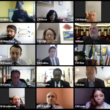It was a defining moment, and it was also long overdue. In the summer of 2020, with the country gripped by a global pandemic that also sharpened the wealth divide of the digital economy, a congressional committee brought the CEOs of Amazon, Apple, Facebook, and Google to account. They asked why the firms, claiming to be neutral platforms, preferenced their own products. They asked why small businesses were afraid to openly discuss predatory business practices. And they asked about election interference, disinformation, civil rights, and privacy.
This was not the two days of photo ops that Mark Zuckerberg enjoyed when he appeared before Congress in the spring of 2018. In those days, members of Congress asked questions as if they were enrolled in Internet Companies 101. Little action followed. No new legislation. The dominance of the tech firms grew as shopping malls and small businesses across the country collapsed, long before a national health crisis.
Representative David Cicilline, the former mayor of Providence, had a different plan. Over the last few years, the chairman of a House subcommittee charged with antitrust pursued an in-depth investigation into the business practices of the largest tech firms, organized briefings and hearings, worked with Republican members, and let loose his talented staff. This week there was a hearing in Congress that, for the first time, actually treated tech company CEOs as if they were subject to the laws of the United States and not simply as donors to political parties or advisers to presidential candidates.
That was the milestone, and it is difficult to overstate its significance. Over the past decade, Washington has endured a form of agency capture unmatched in modern U.S. history. The revolving door spun fast in the halls of power, as tech company employees and policy advisers traded places with such frequency that there was barely time to update email addresses. Several of the D.C. advocacy groups, long funded by Silicon Valley to avoid government regulation—including the backers of net neutrality (which preferences Google’s dominant position for internet services) and section 230 of the Communications Decency Act (the immunity shield that preferences the speech of internet companies over actual publishers and journalists)—did a quick pivot. They embraced tech industry oversight.
Others held fast to their economic worldviews. Several members of the House committee, looking over the dais at tech firms checking in at more than $1 trillion in capital value, said “Big is not necessarily bad,” and perhaps there is some truth in that statement. Consider the cosmos. But “big and unaccountable” is necessarily bad. As the New Brandeisians have argued, monopoly power has far-reaching implications for American democracy. Tim Wu, Lina Khan, Barry Lynn, and others are drawing on lessons of history and the current experience of local communities to argue for an overhaul of antitrust law, largely out of concern that U.S. political institutions are at risk as economic power becomes more concentrated. As Brandeis had warned, “We can have a democratic society or we can have the concentration of great wealth in the hands of a few. We cannot have both.”
Much of the current antitrust debate turns on the “consumer welfare standard,” a popular laissez-faire doctrine that has, at least in the last few decades, left U.S. firms subject to far less scrutiny than they deserved. There are still economists (many working for the tech industry) who believe that the consumer welfare standard remains a viable antitrust theory. They are living in an era that predates the internet economy, when price effects may have been a useful measure of market power. No one today is worried that the cost of Gmail may rise 10 percent next year. But a user looking for an alternative email service will have few places to turn. And even if they sign up for another service, there is no guarantee it will not simply be acquired by a tech giant. Just ask a user of WhatsApp who has their data now.
The consolidation of the tech industry is fueled by the desire for user data. That is why Facebook acquired WhatsApp. That is why Google is going after Fitbit. That is why, in the earliest days of the internet economy, Doubleclick—the internet advertising firm later acquired by Google—went after Abacus. This was not hard to see coming. The Electronic Privacy Information Center and other consumer groups argued almost 20 years ago that the Federal Trade Commission should have intervened in the Abacus deal. And we made similar arguments about the acquisitions of Doubleclick, WhatsApp, Nest, Fitbit, and many others. The FTC had two decades to develop an antitrust theory for the internet economy. But the FTC chairman, Joe Simons, recently told reporters, with a heavy heart, that it was unlikely that the FTC would complete the antitrust investigation of Facebook before the November election.
We also explained to the Senate Judiciary Committee, back in 2007, that Google’s increasing appetite for other internet services would disadvantage advocacy organizations as well as business competitors. We documented how Google promoted its own videos on “privacy,” while demoting ours, after the search company acquired YouTube. In Europe, where the debate over competition and remedies is much further along, the search company is now required to promote non-Google services. That is good for consumers, for new entrants, and for competition.
The failure of the United States to update U.S. privacy law has also fueled consolidation. In a world of privacy policies—but not actual privacy laws—consumers are left with take it or leave it propositions, an avalanche of legalese of interest only to privacy lawyers. And market-based models that would encourage the sale of personal data, now in vogue in Silicon Valley, reflect a profound misunderstanding of the modern-day right of privacy. Privacy today is about fairness, accountability, and transparency in automated decision-making. Those are the decisions that impact housing, employment, credit, education, and criminal justice. No one should have to pay to avoid unfair, opaque, or biased outcomes.
In discussions about regulating Silicon Valley, U.S. firms often point to the growing power of Chinese tech companies and genuine concerns about a political model that aligns large firms with centralized state authority and promotes mass surveillance. But the answer to that argument is more innovation, more competition, and more respect for democratic values, including privacy protection. Monopolists are not innovators, and if the U.S. is to maintain an edge in the increasingly high-stakes battle for technological leadership, it will require a movement away from de facto national firms. Innovation that is less dependent on the collection and use of personal data could also make U.S. businesses and government agencies more resilient as cyber conflict intensifies. The widely known secret is that vast troves of personal data of Americans is held now by foreign adversaries. Just ask Equifax or the U.S. Office of Personnel Management.
Outside of Congress, state attorneys general are also pursuing substantial investigations. Although there is some partisan angling and also overstated concerns about censorship of conservative views (let me know when the president is unable to tweet his nonsense to 83 million followers), the concern among attorneys general is long-standing. More than a decade ago, Connecticut Attorney General Blumenthal launched the successful investigation of Google “Streetview,” Google’s plan not only to conduct surveillance of towns and cities but also to track the location of Wi-Fi hotspots to displace a business competitor. Back in Washington, the FTC, the Federal Communications Commission, and the Department of Justice all took a pass, even after they learned that Google was also intercepting Wi-Fi communications.
So Representative Cicilline’s hearing this week also stands in contrast to “business as usual” and other congressional committees that have largely overlooked the FTC’s failure to use its antitrust authority and have also sat on legislation to update U.S. privacy laws. This should have been the year that Congress enacted a comprehensive privacy law and established a data-protection agency. Instead, personal data collection is accelerating as the country becomes ever more dependent on online services.
Whoever is chairing congressional committees next year should take their cues from Chairman Cicilline and embrace real oversight, regardless of who is in the White House. Federal agencies fail to safeguard the public when congressional committees fail to do their job. And it will require action by the Federal Trade Commission, the Department of Justice, and others to restore competition to the internet industry. That was one of the many lessons in democratic government provided by the House Antitrust Subcommittee this past week in Washington.
Marc Rotenberg is director of the Center for AI and Digital Policy and former president of the Electronic Privacy Information Center.





There’s a simple solution to leveling the playing field in a very pro-consumer way. Require that Big Tech give consumers full transparency on the data they collect or store on them and also receive consent to use that data. Every single data item. Consent would force companies to provide algorithmic transparency and to compete on how well they served the consumer’s interests.